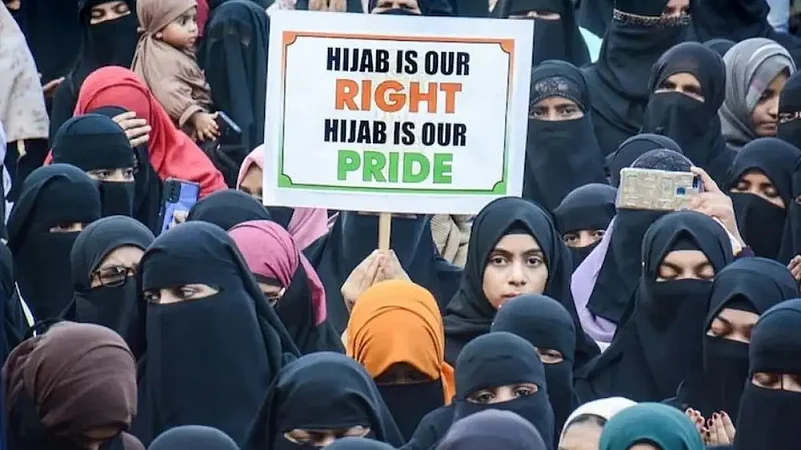Following the month-long controversy over the Hijab row, the Karnataka High Court on Tuesday dismissed the petitions filed by a section of Muslim students from the Government Pre-University Girls College in Udupi. The students sought permission to wear Hijab inside the classroom.
The controversy erupted into a row when girls were denied entry inside the college for wearing headscarves. The issue, soon, became a hotbed of communal conflict, when groups of saffron-clad men barged inside the campus protesting against the students. The protest soon spread across different parts of the state even as the government insists on a uniform code.
Advertisement
Pronouncing its verdict, the HC noted that the prescription of school uniform is only a reasonable restriction, constitutionally permissible which the students cannot object to, a three-judge bench of the court further noted.
Here’s what the verdict further noted:
1. A three-judge bench consisting of Justice Krishna S Dixit, Justice J M Khazi and Chief Justice Ritu Raj Awasthi said, “We are of the considered opinion that wearing of Hijab by Muslim women does not form a part of essential religious practice in the Islamic faith.”
2. The court dismissed the plea to initiate a disciplinary inquiry against the college, its principal and a teacher.
Advertisement
3. The bench further noted, "In the above circumstances, all these writ petitions being devoid of merits are liable to be and accordingly are dismissed. In view of the dismissal of the writ petition, all the pending applications fell into insignificance and are accordingly disposed off.”
4. The full bench of the High Court comprising Awasthi, Dixit and Khazi was constituted on February 9 on a petition filed by girls from Udupi who prayed that they should be allowed to wear Hijab even inside the classroom along with the school uniform as it was part of their faith.
5. The bench also maintained that the government has the power to issue impugned government order dated February 5, 2022, and no case is made out for its invalidation. By the said order, the state government had banned wearing clothes that disturb equality, integrity and public order in schools and colleges.
Security Beefed Up
Ahead of the verdict, Mangaluru Deputy Commissioner R Selvamani announced that all schools and colleges would remain shut on March 15 in Mangaluru and Shivamogga. He also added that the external examinations schedules would remain unchanged while the internal examinations conducted by the schools and colleges would be postponed.
Restrictions on the celebration of the verdict have also been imposed.
Section 144 of the Code of Criminal Procedure has been imposed in Bengaluru for one week, starting from March 15.
The Story So Far
On January 1, 2022, six girl students of a college in Udupi attended a press conference held by the Campus Front of India (CFI) in the coastal town protesting against the college authorities denying them entry into classrooms wearing headscarves. This was four days after they requested the principal permission to wear hijab in classes which were not allowed.
Advertisement
According to the college’s principal, Rudre Gowda, earlier students would wear Hijab to the campus but open them once they entered the classrooms. Gowda said that for 35 years, there has been no such rule and students would always enter classrooms without a headscarf. However, he alleged that those who were creating a ruckus, had an outside backup.
On January 26, the Karnataka government set up an expert committee to resolve the issue. It was announced that all girls should adhere to uniform rules until a committee offers its recommendations.
Meanwhile, the Udupi students filed a writ petition in the Karnataka High Court seeking a declaration that wearing a Hijab is a fundamental right. The plea stated that the Indian constitution guarantees the freedom of conscience and the right to profess, practise and propagate religion.
Advertisement
As the issue of Hijab versus saffron scarves spread to several educational institutions in many parts of Karnataka, the state government announced a holiday from February 9 to February 15 in all the pre-university colleges and from February 9 to February 16 in degree and diploma colleges.
The girls then approached the Karnataka High Court seeking relief and quashing the government order on February 5 restraining students from wearing any cloth that could disturb, peace, harmony and public order.
(with agency inputs)




















